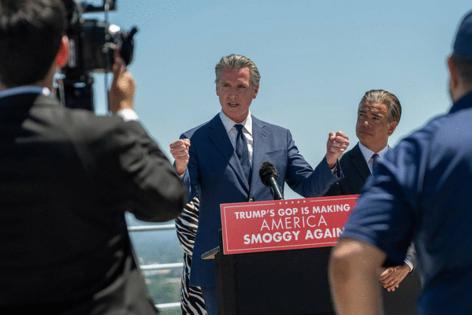California to sue over Congress blocking climate waivers
Published in Political News
SACRAMENTO, Calif. — The Senate’s unprecedented move to revoke California’s ban on gasoline-powered cars by 2035 threatens to upend the U.S.’s status as both an economic powerhouse and a world leader on climate change mitigation, Gov. Gavin Newsom told reporters Thursday.
He and Attorney General Rob Bonta announced plans to sue to block Congress from revoking the ban Thursday morning at the California Environmental Protection Agency office in downtown Sacramento.
In 2020, Newsom issued an executive order directing the state to phase out all sales of gas cars to encourage consumers to purchase electric vehicles and cut down on greenhouse gas emissions. Under the Clean Air Act of 1970, California can set its own climate emission standards that are more stringent than federal guidelines but must get federal approval to adopt individual rules.
Vehicle manufacturers often tailor their cars to meet California’s standards, and other states often follow suit. The Environmental Protection Agency granted the waiver allowing the gas cars phaseout in December, in the waning days of the Biden administration.
The Senate’s 51-44 vote Thursday morning using, for the first time, the Congressional Review Act to revoke that waiver now threatens to set a political precedent of impeding upon states while “selling out” future generations who will have to live in an increasingly hotter and inhospitable world, Newsom said.
“What the Senate did has been referred to correctly as a nuclear option. They decided to change the rules that have been established in the United States Senate, protocols that have been well established for centuries, in order to attack California, in order to pollute more,” he told reporters. “This isn’t complicated. This is about the act of theft, because pollution is a subsidy. It’s an act of theft against our kids and grandkids.”
He and Bonta said they would fight the revocation in court, which they called “illegal” after Senate Republicans circumvented findings from its own parliamentarian and the Government Accountability Office, which found that using the CRA to fast-track the waiver revocation vote was improper.
The governor, who is the co-chair of the U.S. Climate Alliance, also framed the vote as a hypocritical repudiation of the Republican Party of the past. He cited Richard Nixon’s championing of the Clean Air Act and then-Gov. Ronald Reagan’s establishing the California Air Resources Board in 1967.
“I was in the Oval Office a few weeks back, and in anticipation of this moment, I looked up just right above President Trump. Above the resolute desk, interestingly, is a portrait of Ronald Reagan,” Newsom said Thursday. He said he told Trump that the “moment you sign this bill authorizing the degradation of his legacy, he’ll be looking down in shame when you sign this bill.”
Trump laughed in response.
“He laughed,” Newsom said. “But it’s not funny.”
Republicans saw the Senate vote as a victory against what they framed as Newsom’s overzealous climate policies.
“Newsom’s gas car ban was never about the planet. It was about control,” California Assembly Minority Leader James Gallagher, R-Yuba City, said in a statement. “You like your car? Too bad. Can’t afford a new one? Sucks for you. Grid overloaded? Not his problem. This wasn’t climate policy. It was punishment for not living like an activist. The rest of the country finally said no thanks.”
Rep. Kevin Kiley, R-Roseville, led the House vote to overturn Newsom’s electrical vehicle mandate.
“Californians can be grateful that we have checks and balances,” he said. “Gov. Newsom’s attempt to unilaterally ban most of the cars in our state could not survive a Democratic vote by representatives of the people ... Californians should be able to drive the car of their choice, not one chosen for them by the government.”
Sen. Elissa Slotkin of Michigan, the lone Democrat to side with Senate Republicans, said she cast her vote to stand up for her constituents whose livelihoods depend on automakers like Detroit’s General Motors
Newsom said electric vehicle technology was rapidly changing fast enough for middle-class people to afford them, citing a Chinese-made BYD car that costs $9,700.
“I just think that’s a vision to celebrate, not the vision of the 1950s and 60s in Los Angeles, where business leaders were moving out en mass because they couldn’t breathe,” he said.
____
©2025 The Sacramento Bee. Visit at sacbee.com. Distributed by Tribune Content Agency, LLC.

























































Comments